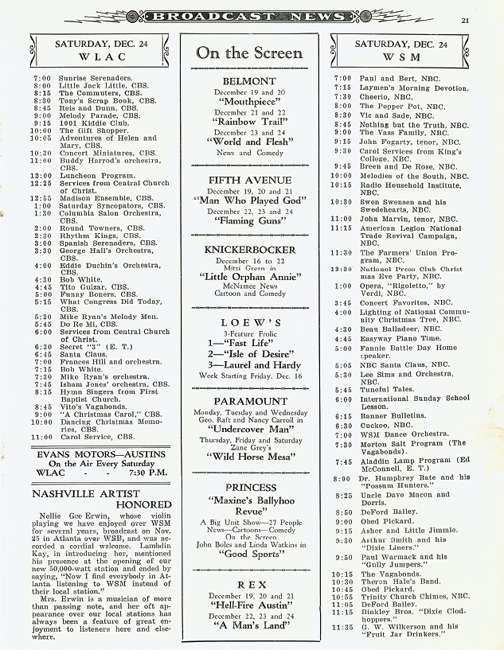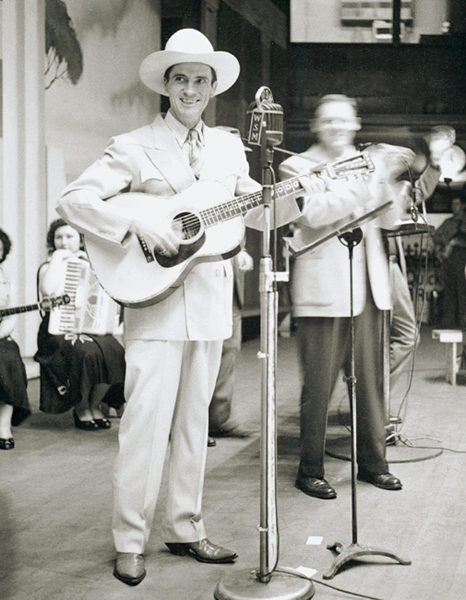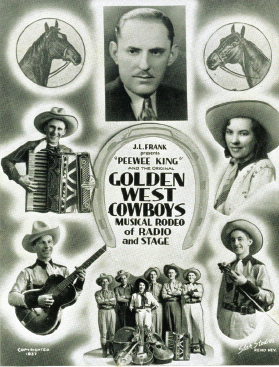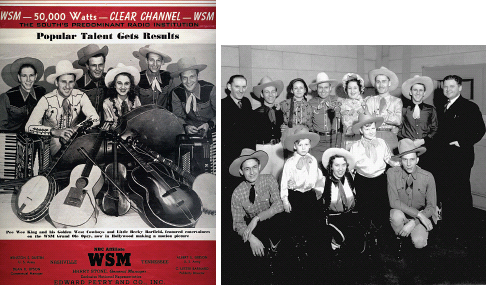The Grand Ole Opry (9 page)
Read The Grand Ole Opry Online
Authors: Colin Escott

Free tickets to the show were handed out by National Life “Shield Men.”
WSM’s Home Office Shield magazine,
October 1936:
About twenty-five percent of the capacity crowd, which runs well over three thousand people, are from other states. The boys
on the door look at the license plates on cars which line up the streets within a half-mile radius of the Grand Ole Opry House.
They report licenses from ten to fifteen states on average. Believe it or not, thousand mile trips are made with the sole
purpose of visiting the Grand Ole Opry. The audiences are the most friendly to work for, and WSM has no trouble whatever.
Once in a while, some of the youngsters get a little frisky outside the building, but two uniformed policemen take care of
them in short order and in a nice way.
In fact, there was often unruly behavior, and WSM’s mail-room employee, Jim Denny, made a little weekend money as a bouncer.
JIM DENNY:
If someone was acting up and disturbing people, I would ask him very sweetly to leave. If he gave me any backtalk at all,
it was WHAM! Right then! A right to the head. Usually by the time they got over their surprise, they were outside.
But Jim Denny had ambition. He watched and learned as Harry and David Stone recruited the stars who would ensure the Opry’s
future. Denny would eventually take over the Artists Service Bureau from David Stone, and make the position into one of the
most powerful in country music.

G
RAND
O
LE
O
PRY
NEW MEMBERS: 1930s
R
OY
A
CUFF AND
H
IS
S
MOKY
M
OUNTAIN BOYS
Z
EKE
C
LEMENTS
THE D
ELMORE
B
ROTHERS
C
URLY
F
OX AND
T
EXAS
R
UBY
H
ILLTOP
H
ARMONIZERS
J
AMUP AND
H
ONEY
P
EE
W
EE
K
ING AND
H
IS
G
OLDEN
W
EST
C
OWBOYS
T
HE
L
AKELAND
S
ISTERS
L
ASSES AND
H
ONEY
R
OBERT
L
UNN
S
AM AND
K
IRK
M
CGEE
B
ILL
M
ONROE AND
H
IS
B
LUE
G
RASS
B
OYS
N
AP AND
D
EE
F
ORD
R
USH
S
ARIE AND
S
ALLY
J
ACK
S
HOOK AND
H
IS
M
ISSOURI
M
OUNTAINEERS
A
SHER AND
L
ITTLE
J
IMMIE
S
IZEMORE
T
HE
V
AGABONDS

THE STAR SYSTEM
U
ncle Dave Macon, Sam and Kirk McGee, and other in the Opry cast provided a link to the show’s earliest and rowdiest days,
but several stars who’broadened the Opry’s popularity in the 1930s, including the Delmore Brothers and the Vagabonds, left
within a few months of each other in 1938. And DeFord Bailey’s days were numbered.
DeFord Bailey’s dismissal in 1941 remains controversial, but the likeliest reason is that his songs were licensed for performance
through the American Society of Composers, Authors and Publishers (ASCAP). In 1941, the National Association of Broadcasters
felt that ASCAP was holding radio to ransom and decreed that no one would perform ASCAP-protected songs on-air. The broadcasters
set up a rival performing rights society, Broadcast Music Inc. (BMI), and DeFord Bailey probably refused to learn BMI-protected
songs. Bailey, though, believed that the Opry had other reasons for dismissing him.
Ernest Tubb.
JUDGE HAY:
DeFord was a bright feature of our show for fifteen years. Like some members of his race and other races, DeFord was lazy.
He knew about a dozen numbers which he put on the air and recorded for a major company, but he refused to learn any more,
even though the reward was great. He was our mascot and still loved by the entire company. We gave him a whole year’s notice
to learn some more tunes, but he would not. When we were forced to give him his final notice, DeFord said without malice,
“I knowed it wuz comin’, Judge, I knowed it wuz comin’.”
D
E
FORD BAILEY:
[Judge Hay] had a boss, too. It was the company. It’s terrible for a company to say things like that about me. That I didn’t
know no songs. I reads between the lines. They seen the day was coming when they’d have to pay me right, and they used the
excuse about me playing the same old tunes. I walked out of WSM with a smile. I told myself, “God gave every man five senses
and I’m going to use them. I ain’t gonna work for another man as long as I live.” I made the back room of my house on Thirteenth
Street into a shoe shine parlor, and I cooked dinners and sold’em to workmen.
What’s certain is that DeFord Bailey was not replaced by another harmonica soloist, black or white. The day of the instrumental
soloist on the Opry had gone. The departed stars were replaced by Pee Wee King, Roy Acuff, Bill Monroe, Minnie Pearl, and
Ernest Tubb. There was no master plan behind their hiring, but these new stars would create a fanatically loyal audience numbered
in the millions. They not only broadened the show’s appeal but (with the exception of Pee Wee King) stayed into the 1980s
or beyond, thereby creating the continuity for which the Opry became renowned. The Grand Ole Opry would make them household
names, and they in turn would become its mainstays.
Born Julius Frank Kuczynski in Milwaukee, Wisconsin, Pee Wee King was in some ways a more unlikely Opry star than DeFord Bailey.
An accordionist, his earliest appearances were at polka dances in Polish community centers around the upper Great Lakes. Pee
Wee not only brought Eddy Arnold, Cowboy Copas, and Grandpa Jones to the Opry, he brought his father-in-law, J. L. Frank,
who booked many Opry touring packages, and played a role in the Opry’s acquisition of Roy Acuff and Ernest Tubb.

Elected to the Country Music Hall of Fame in 1967, J. L. Frank was known as the “Flo Ziegfeld of country music,” and was the
first promoter to see the nationwide potential of Opry acts in touring packages.
PEE WEE KING:
Mr. Frank had gotten Gene Autry his movie contract, but he decided not to go out there himself. Gene gave me a sense of what
I wanted to do musically, but Joe Frank showed me how to do it. I married [Frank’s stepdaughter] Lydia, and I formed the Golden
West Cowboys. We tried to make the Cowboys a unique band. We were a dance band and more. By the time we got to the Opry, we
were a well-rehearsed, versatile band. We could play single-note violin, an accordion playing two-part harmony, waltzes, two-steps,
polkas, ballads. My boys could all read music. One of Mr. Frank’s main goals was to get one of his acts on the Opry, and we
were the first one to make it. We went down for an audition on Easter weekend of 1937, and we were asked to stay for the Saturday
night shows.
If Judge Hay had not been on p1ended sick leave, it’s doubtful if Pee Wee King would have been hired. Pee Wee’s music was
too slick and up town for the Judge, but Hay wasn’t there and Harry and David Stone heard an artist who would professionalize
the show
DAVID STONE:
It was one stormy, snowing afternoon. Almost everyone in the office had gone home. Vito Pellettieri and I were in the studio,
and J. L. Frank came in with his group, the Golden West Cowboys. They did a very short audition, fifteen or twenty minutes.
On our recommendation [to Harry Stone], Pee Wee brought the group down. They were neat, well-dressed, enthusiastic. They displayed
good showmanship and good entertainment. They just said, “We like it in Louisville, but we would very much like to come to
Nashville.”

left: 1938 WSM program release featuring Pee Wee King and His Golden West Cowboys.
right: J. L. Frank (top left) and two of his acts, Gene Autry (back row, fourth from left) and Pee Wee King and His Golden
West Cowboys, visit the WSM studio. Posing with them are comedians Sarie and Sallie and Asher Sizemore with his sons, Buddy
Boy and Little Jimmie.
ALTON DELMORE:
Joe Frank goes, I think, as one of the most neglected persons in the entire field of country music. Joe was an outstanding person who could prod out real talent when he found it. He was a down-to-earth businessman
who knew what would go in the game. He talked and acted like a plowboy but had a tremendous knowledge of the entertainment
world. He always had his heart in his work and always had a good word for down-and-out musicians and a handout if they asked
for it... and a lot of times when they didn’t ask for it. I give Joe Frank credit for putting the Grand Ole Opry in the big-time
class and big-time money.
Pee Wee was the first Opry act to join the Musicians Union, and, in 1938, became the first to appear in a movie when he made
a cameo appearance in Gene Autry’s
Gold Mine in the Sky.
PEE WEE KING
I think they asked us to join the Opry because we were microphone minded. There was no hesitation. No drawn-out pauses between
our tunes. We knew what we were doing because we were organized. This was the way we made a living. Most of them who were
on the Grand Ole Opry were farmers and had jobs and did this on Saturday night only. We made our living in the music business.
